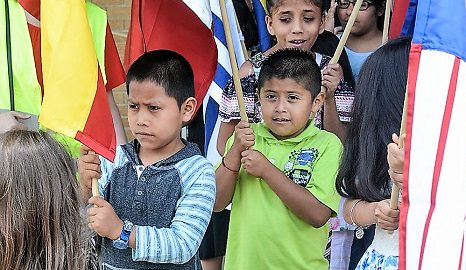Rocco Magnelli, Jr. knows about addiction. His 20-year old son died from an opioid overdose in 2015 and his youngest daughter is an addict. As a recovering alcoholic, Magnelli serves as a sponsor to those suffering from the disease of alcohol and substance abuse.
“I understand the addict’s mind, and the struggles,” Magnelli said. “The solution has nothing to do with willpower, but a higher power.”
With more families and individuals being overwhelmed by the epidemic of opioid abuse and alcoholism, the board of directors of Our Campaign for The Church Alive! approved an evangelization grant to help establish a diocesan-wide Addiction Recovery Ministry.
Developed by Father Michael Decewicz, pastor of St. Juan Diego Parish in Sharpsburg, the ministry will operate out of the parish’s John Paul I Center. There is space for 12-step recovery meetings, prayer and Bible study groups and educational forums, with referrals to community resources. Special Masses and anointing of the sick also will be available.
“The emphasis is on Step Five, making a personal moral inventory,” said Magnelli, a member of the ministry team. “Addicts and alcoholics must admit the exact nature of their wrongs.”
Father Decewicz, who has been open about his own recovery from alcoholism, said the center will provide a one-on-one ministry for abusers and their family and friends, while also supporting clergy, school principals, directors of religious education and pastoral associates who are offering assistance. He feels an additional urgency because he is the recipient of a kidney transplant.
“I know I’m on borrowed time, and I see how the outbreak is growing,” Father Decewicz said. “This ministry is a good way to evangelize, preaching the gospel and giving back.”
Allegheny County recorded 735 overdose deaths in 2017, according to revised data, the third year in a row that it broke its own record. Fatal overdoses also have risen dramatically in Butler and Lawrence counties, falling slightly last year in Washington and Beaver counties after recent increases.
An estimated 23 million Americans suffer from addiction to drugs or alcohol, and more than 610,000 died from opioid-related overdoses nationwide from 1999 to 2016.
Hospitals, rehabilitation centers and government agencies are collaborating with communities to combat the crisis, but this approach is pastoral, and includes leaders of other faith traditions.
“The paramount dynamic of our ministry is spiritual—how we manifest and respond to the love of God,” said psychologist and author William Kraft, who serves on the team. “It works well for the Church Alive. The time is ripe.”
Team member Julie Truver, whose family has been impacted by substance abuse, said that while some people are able to quit drugs, the statistics for full recovery are grim.
“This is a lifelong battle for addicts,” she said. “Education is a priority and needs to begin at the grade school level with parents and children.”
“Addiction disconnects people from themselves, from loved ones and from God,” said Jim Hanna, pastoral associate at St. Anne Parish in Castle Shannon, who helped to found the parish-based Substance Addiction Ministry in 2014. “This new diocesan center will make a difference and show the church is serious about responding.”
Christian Brother Mark Lowery, who has been in alcoholism recovery for nearly a quarter century, likes the idea of a place where people can come for meetings and get spiritual help.
“I work with younger ex-convicts who are in recovery and every month I bring Central Catholic students to tour the county jail,” Brother Mark said. “They understand this is reality. It makes a big impression on them.”
In the late 1990s and into the 2000s, prescribed pain relievers like Percocet, Vicodin and OxyContin were the main causes of opioid overdose deaths. However, these prescriptions have been declining since 2011, according to the U.S. Centers for Disease Control and Prevention.
Today, the killers are heroin and fentanyl, a synthetic opioid that is 50 times as potent as heroin. The substances are often mixed together.
“The medical profession contributed to the problem in treating pain, but I’ve seen a change in mindset,” said pharmacist Bill Ashton, a member of St. Joan of Arc Parish who serves on the new addiction recovery team.
“Like most pastors, I have presided at many funerals of young people who have died from this epidemic,” Father Decewicz said. “I feel a passion for the church to be a visible sign and presence of love and healing for those in need.”

